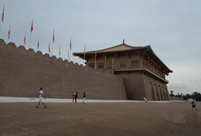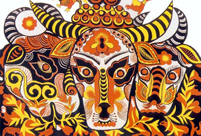 In pics: YOG prism
In pics: YOG prism
 Amputee girl reaches top of half-left tower in Jiangxi
Amputee girl reaches top of half-left tower in Jiangxi
 Yardangs in Lop Nur
Yardangs in Lop Nur
 Intoxicating Ayding Lake in Xinjiang
Intoxicating Ayding Lake in Xinjiang
 Beijing's MJ impersonator a 'thriller' for crowds
Beijing's MJ impersonator a 'thriller' for crowds
 Armed police compete on the plateau
Armed police compete on the plateau
 Rubber Duck settles in Guiyang new urban area
Rubber Duck settles in Guiyang new urban area
 Rare set of giant panda triplets turn one month old
Rare set of giant panda triplets turn one month old
 Closing ceremony of Youth Olympic Games
Closing ceremony of Youth Olympic Games
 Attractive posters to welcome freshmen
Attractive posters to welcome freshmen
WELLINGTON, Sept. 1 -- New Zealand and China are to work together in research that supports the kiwifruit - or Chinese gooseberry industry, particularly in studying diseases such as Psa, under an agreement signed by two government agencies.
New Zealand's Plant and Food government research institute and the Sichuan Provincial Academy of Natural Resource Sciences ( SPANRS) would establish the China-New Zealand Joint Laboratory for Kiwifruit Research, Plant and Food announced Monday.
The "virtual lab" would allow scientists from China and New Zealand to collaborate more closely and provide access to new information to further research, Plant and Food Research chief executive officer Peter Landon-Lane said in a statement.
"Our on-going collaboration has supported research into various areas, most recently in understanding the kiwifruit disease Psa ( Pseudomonas syringae pv. actinidiae) and how this can be managed," said Landon-Lane
"This agreement will allow our scientists to work more closely together and share resources to build knowledge in new areas, including kiwifruit diseases and physiology, and in conservation of the natural germplasm that exists in China."
The Memorandum of Understanding was signed at an event attended by officials from the New Zealand Ministry of Business, Innovation and Employment and China's Ministry of Science and Technology.
In February last year, New Zealand scientists claimed they had genetic evidence that the Psa canker disease that had devastated the country's kiwifruit crops since 2010 originated in China.
At the end of November 2012, an estimated 68 percent of New Zealand kiwifruit orchards were known to have the vine-killing Psa bacterium, up from 26 percent a year earlier.
 Models with two-dimensional codes painted on bodies
Models with two-dimensional codes painted on bodies Antique exhibition of Maritime Silk Road held in Jinan
Antique exhibition of Maritime Silk Road held in Jinan NASA releases images of solar flare
NASA releases images of solar flare Daming Palace in Chang’an City in photos
Daming Palace in Chang’an City in photos Babies of celebrities born in the year of horse
Babies of celebrities born in the year of horse Farmer Painting, one of Ansai's Three Strange Wonders
Farmer Painting, one of Ansai's Three Strange Wonders Special holidays
Special holidays World's top 10 fighters
World's top 10 fighters 'Stewardesses' serve in hospital
'Stewardesses' serve in hospital The biggest duty-free store of the world
The biggest duty-free store of the world Volunteers bid farewell to YOG
Volunteers bid farewell to YOG More police dogs join anti-terror campaign in Inner Mongolia
More police dogs join anti-terror campaign in Inner Mongolia Picturesque Dayilan Manchu village in NE China
Picturesque Dayilan Manchu village in NE China Athletes experience the charm of Chinese traditional opera in Nanjing
Athletes experience the charm of Chinese traditional opera in Nanjing Contestants for Miss Bikini World experience Chinese traditional culture
Contestants for Miss Bikini World experience Chinese traditional cultureDay|Week|Month